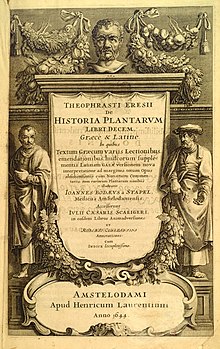Historia Plantarum (Theophrastus)

The frontispiece to an illustrated 1644 edition of Historia Plantarum, Amsterdam
|
|
| Author | Theophrastus |
|---|---|
| Country | Ancient Greece |
| Subject | Botany |
|
Publication date
|
c. 350 BC – c. 287 BC |
| Pages | 10 books, 9 surviving |
Theophrastus's Enquiry into Plants or Historia Plantarum (Greek: Περὶ φυτῶν ἱστορία, Peri phyton historia) was, along with his mentor Aristotle's History of Animals, Pliny the Elder's Natural History and Dioscorides's De Materia Medica, one of the most important books of natural history written in ancient times, and like them it was influential in the Renaissance. Theophrastus looks at plant structure, reproduction and growth; the varieties of plant around the world; wood; wild and cultivated plants; and their uses. Book 9 in particular, on the medicinal uses of plants, is one of the first herbals, describing juices, gums and resins extracted from plants, and how to gather them.
Historia Plantarum was written some time between c. 350 BC and c. 287 BC in ten volumes, of which nine survive. In the book, Theophrastus described plants by their uses, and attempted a biological classification based on how plants reproduced, a first in the history of botany. He continually revised the manuscript, and it remained in an unfinished state on his death. The condensed style of the text, with its many lists of examples, indicate that Theophrastus used the manuscript as the working notes for lectures to his students, rather than intending it to be read as a book.
Historia Plantarum was first translated into Latin by Theodore Gaza; the translation was published in 1483. Johannes Bodaeus published a frequently cited folio edition in Amsterdam in 1644, complete with commentaries and woodcut illustrations. The first English translation was made by Sir Arthur Hort and published in 1916.
The Enquiry into Plants is in Hort's parallel text a book of some 400 pages of original Greek, consisting of about 100,000 words. It was originally organised into ten books, of which nine survive, though it is possible the surviving text represents all the material, rearranged into nine books rather than the original ten. Along with his other surviving botanical work, On the Causes of Plants, Enquiry into Plants was an important influence on science in the middle ages. On the strength of these books, the first scientific inquiries into plants and one of the first systems of plant classification, Linnaeus called Theophrastus "the father of botany".
...
Wikipedia
